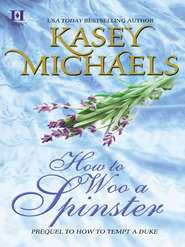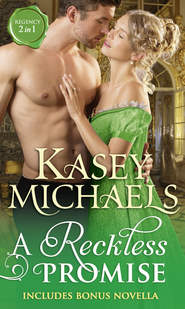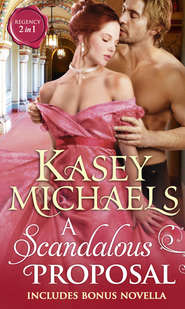По всем вопросам обращайтесь на: info@litportal.ru
(©) 2003-2025.
✖
Shall We Dance?
Автор
Год написания книги
2018
Настройки чтения
Размер шрифта
Высота строк
Поля
“I should never have come back here. Even the old king tried to use me, damn his soul. Sick? That’s what they said, that he was sick, off his head. And I still say that the old madman tossed me down on a couch soon as he came back from opening Parliament—when was that? Oh, I remember. Back in ’02, while George and I were still pretending. Threw me down, Amelia, and would have had his way with me, were it not that the couch had no back and I was able to kick him off, roll free of him. I never moved so fast, before or since. Filthy Hanovers, the worst of our family. Users. And they all did their best to use me. Me, and my poor Charlotte, lost and gone these two terrible years. They kept her from me, you know, even when she cried for me, begged for me. And now she’s gone. My own child…”
Amelia’s soft heart was touched. Her Royal Highness could be crude, could be cantankerous, could be ridiculously generous one moment and horribly selfish the next; dangerously free with her affections and her words. Mercurial. But, at the bottom of it, at the heart of it, the woman hadn’t had the best of lives, and Amelia loved her dearly.
And, loving her dearly, she said the first thing that sprang to her tongue, “We can leave again, ma’am. The world awaits, all of it eager to please you.”
The queen, her coal-black hair fresh from another visit with the dye pots, nodded fiercely, the childish curls bouncing around her rouged cheeks. “Yes, yes. We could go. Pergami would fly to me, I know it, if I were to abandon this damn, damp island. Byron left, you know. Ungrateful England all but tossed him out.” She blinked back tears. “He was such a pretty boy, even with that twisted foot. I could have had him, you know, if I’d but crooked a finger in his direction. Chose Spencer Perceval instead. He was helpful, but not pretty. Sir Sydney Smith? Ah, he was almost pretty, and reportedly hung like a—”
“Yes, ma’am,” Amelia said placidly.
“But you know, Amelia, I only really committed adultery the once—three or six times, in truth. But that was with the husband of Maria Fitzherbert.”
Amelia couldn’t help but smile at Her Majesty’s reference to the king’s morganatic bride. The queen’s outrageous statements, as well as her rather erratic behavior, had lost the power to embarrass her years ago. Still, she had to steer the woman back on point, even as she’d stupidly let it slip that she wished to put England behind them once and for all. “So, dear ma’am, shall I give the order? We can set sail by week’s end. Paris. Rome. Anywhere your heart desires.”
The queen snorted. “I doubt we could make Dover on what’s left of my allowance. That hangs in the balance, you know. The king—I spit on calling him thusly—holds the purse strings now. That’s another part of this Pains-and-Penalties business. My pain, the penalties he’d order. I have to win, Amelia, or else he’ll control every aspect, every penny in my purse, every bite that goes into my mouth. He’d like nothing more than for me to live in penury.”
“Then we stay,” Amelia said, continuing to guide her queen back toward the correct, the only, path, without letting the woman see the leash. Amelia had been against their return, but also knew they had no choice but to stay and fight now that they were here. But it had to be the queen’s decision, at the end of it.
The queen’s sigh ended in a curse that had a lot to do with hungry mice finding a home in her estranged husband’s bowels. “Yes, we stay. We stay and we fight. Oh, Amelia.” She moaned piteously, holding out her hands so that Amelia left her seat and took those hands in her own. “I do it for you, my dearest girl. Not for me, for I am old, and ravaged, and have no future save pain until death. For you, for my dear William, for all of you. And for England! England needs me! England loves me!”
With the queen’s many rings painfully biting into her skin, Amelia smiled and dropped into a deep curtsy. “And England thanks you, my queen.”
“Yes, yes, of course, there’s all that drivel, too,” the queen said curtly, releasing Amelia’s abused fingers as the pendulum of her mood swung once more. “Look at that mess. For God’s sake, girl, get someone in here to clean it. Am I to live in filth as well as penury?”
“Yes, ma’am,” Amelia said, hiding a smile as she gave the bell rope a tug, then returned to gather up the official notice of the Pains and Penalties that had made for an exceedingly hysterical morning. “With Your Majesty’s permission, I shall retire to the kitchens to personally order strawberry tarts for tea. Your favorite, ma’am.”
The queen was suddenly girlish, her cheeks coloring even beneath the spots of rouge, her smile shy. “I really shouldn’t indulge, not when I must prepare to meet my subjects. I needs must look my best.”
“You are always at your best, ma’am, and dear in the hearts of everyone,” Amelia said, knowing the words sounded old and worn but unable to think of new ones, and the queen waved her away, toward the kitchens.
BERNARD NESTOR sat at the rude table in his ruder kitchen, devoid now of even the single servant he’d had to turn off, and studied the copy of the Bill of Pains and Penalties he’d stuffed into his coat just after Henry Brougham had given him his congé and told him never to darken his door again.
Gratitude. There was none in this cruel and unenlightened world. He’d been a loyal Whig, a loyal employee of Henry Brougham’s, a diligent worker.
And what had he gotten for this devotion?
He’d gotten the sack, that’s what he’d gotten.
Too rabid. Too rigid. Too intense. Too much of a danger when clear heads, not hotheads, are needed. That’s what Henry Brougham had said.
Five years. He’d worked, slaved, and with little financial remuneration, for five long years, monitoring Princess Caroline’s movements, warning Henry Brougham in time to head off at least a half-dozen disasters as the woman made a fool of herself across the continent.
And now, now when the queen really needed him, he’d been cast aside as too fervent, too volatile, too dangerous.
England needed their new queen. England needed the Whigs back in power. England would become another France, with its own bloody revolution, if the king and those damn Tories were left to their own devices.
The world was black or white to Bernard, right or wrong, innocent or guilty and with no shades of gray. The world was reasonable this way for Bernard, and it was so much easier to tell the Good from the Bad without having to invest in any heavy thinking.
He stared at the rather dirty tumbler of inferior wine that was all the penny-pinched younger son could afford before his hand shot out, sweeping the thick glass off the table, only to have the thing thunk against the floor-boards; not even giving him the solace of smashing into a thousand pieces.
Fools! They were all fools! Didn’t they know how much danger the queen was in, the Whigs were in, now that this damned Pains-and-Penalties nonsense was fact?
He grabbed at the pages, glaring at the crabbed, hurried writing, as he’d had to take Henry Brougham’s copy into a dark closet with only one candle to aid him as he’d copied it, word for damning word.
He found what he was looking for and read the words aloud:
“…to deprive Her Majesty, Caroline Amelia Elizabeth, of the Title, Prerogatives, Rights, Privileges and Exemptions of Queen Consort of this Realm; and to dissolve the Marriage between His Majesty and said Caroline Amelia Elizabeth.”
Bernard picked up the wine bottle by the neck and drank deeply. “Treason. Blasphemy.” He frowned, then decided he was right. Yes. Even blasphemy, if he sort of tipped his head and squinted as he looked at the thing. “But how to stop it? God knows the wretched woman is guilty of every charge against her, and more.”
And Bernard knew, because it had been Bernard’s job to know.
Pergami. Bartolomeo Bergami, now Pergami; now even—courtesy of the then Princess Caroline—Knight of Malta, Baron de la Francine. There was one for the books: the upstart Italian paramour, elevated to such a station by reason of what could only be assumed was his talented cock. For the privilege of servicing a loud, overblown, ridiculous creature, he had been given money, titles, position…and a deep gravy boat for all his relatives to swim in as part of Caroline’s entourage.
The Tories would destroy her, through Pergami. The pains would be clear, the penalties clearer.
And England, under the Tories, would go down in the annals of history as one very large failure.
Unless…unless he, Bernard Nestor, was right, and he was always right. For, in The World as Seen by Bernard Nestor, he was forever cast in the leading role, that of hero, savior. Why, when he thought of himself that way, he even thought of himself as being taller, wider. With a chin.
He pushed himself away from the table and staggered, rather drunkenly, to the locked desk in his small sitting room. He shook his head to clear it (a fruitless effort, alas, for the fanatic in Bernard had evicted clear thinking years earlier), then unlocked the drawer that held everything he knew about one William Austin…and the other one.
He turned pages in the slim portfolio, reading yet again that Caroline had been all but physically ejected from the royal household in 1797, all but barred from her own child.
He read again that William Austin was believed born in the first month of 1801, and later adopted by the princess. Unlike the Tories, Bernard had done his best this past year and more to locate proof of William Austin’s legitimacy, that he had not been a bastard birth. Wouldn’t that turn everything on its head! It was brilliant, absolutely brilliant, a coup that would give Bernard everything he had always wanted.
But he had found nothing that hadn’t already been discovered.
About William Austin.
He had, however, as he’d investigated, one by one, all the orphans Caroline had collected, been drawn to one Amelia Elizabeth Fredericks.
Her mother supposedly perishing in childbirth, Amelia Fredericks had been brought up among the coterie of assorted waifs Caroline had accumulated, although she’d formally adopted only William Austin.
Where better, Bernard had concluded, to hide but among a crowd? And how better to hide what must remain hidden than by allowing everyone, even steering everyone, toward another target altogether?
The girl’s name was not at all significant. Everyone seemed to name their children after royalty, and Caroline had probably had the liberty to do the same for the supposed orphaned child. This, in itself, was not remarkable.
Bernard turned a few more pages, until he came to the pen-and-ink reproductions he’d bought, one from a hawker here in London, one he’d paid a pretty penny for, on his own, from a contact he’d made in Italy.
On his left, Charlotte Sophia of Mecklesburg-Strelitz, mother of the new king and for whom his only daughter had been named, both Charlottes dead and gone these past two years. A handsome woman, not beautiful, but definitely striking. Regal.
On his right the orphan, Amelia Elizabeth Fredericks.
And then he located the third, a rude reproduction of George Augustus Frederick, now George IV, in his flamboyant youth.
Squinting, Bernard Nestor looked for physical resemblances and, in his mind, found them.
AMELIA STOOD in front of the mirror in her bed chamber in the residence overlooking the Thames, her head tilted slightly to the left as she looked into the assessing eyes reflected there.











